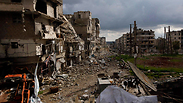
Providing protection to Druze in heart of Syria will slowly draw Israel into Syrian chaos
צילום: רויטרס
Israel must beware of the Syrian Druze trap
Op-ed: Limited humanitarian aid to ethnic groups in enemy states must not drag Israel again into imperial adventures and dreams about changing regimes and crowing kings.
A team of the IDF's top Druze officers, in the past and in the present, arrives secretly at the prime minister's bureau with a request that Israel will defend the Druze in Jabal al-Druze in Syria against the radical Sunni Islamist movements, which wish to settle the score with the Druze who support the Assad regime.

A groundless scenario? Not at all. They may not only be Druze officers, but also politicians and the community's dignitaries. There is a chance that such a request will reach the prime minister in a month, in half a year, and maybe even earlier.
The reports in the Arab press about the situation in Syria present a picture of a collapse of the Assad regime. Some of them are biased and exaggerated, but as the regime grows weaker – the picture of Syria disintegrating into ethnic cantons and areas of influence of armed bodies like the Islamic State becomes clearer.

Druze in the Golan Heights. It's only a matter of time before the Druze community asks Israel to defend the residents of Jabal al-Druze in Syria against radical Sunni Islamist movements (Archive photo: Avihu Shapira) (צילום: אביהו שפירא)
Israel has already faced requests from the Druze community to help the Druze in neighboring countries. In the first Lebanon War, for example, Israel stood as a barrier at a certain stage between the Druze and the Maronites. What will happen this time?
The Lebanese media reported many months ago that Israel was providing protection to the five Druze villages in the northern Syrian Golan Heights following an appeal from the Druze community dignitaries in Israel. These villages are located on the border, but how will Israel provide protection to the villages in Jabal al-Druze, which is located at a distance of tens of kilometers inside Syria.
The Israeli dream to team up with the Druze in Syria is not new. In a recently published book, senior Mossad official Yossi Alpher reveals Israel's tireless search for allies in the region, from South Sudan to Tehran – a search which generated few successes and a lot of frustration and disappointment.
Among other things, Alpher reviews the attempts to team up with the Druze in Syria, which reached their peak in the plan formed in 1967 on the backdrop of the euphoria following the occupation of the Golan Height. But Yigal Alon's dream of renewing the free Jabal al-Druze state on the Jordan-Syria border faded after the Druze in the Golan leaked the plan.
Alongside the known ties with Sudan, Ethiopia, Kenya, Iran and the Kurds in Iraq, the book also reveals forbidden affairs – like the short affair Israel had with the radical regime in Somalia in the 1980s. In this case, Israel was wise enough not to get drawn into the anarchy of that dangerous country.
The Druze's distress in Syria today, which will grow worse as the Alawite regime is pushed aside, will place Israel in a dilemma. Providing protection to the Druze in the heart of Syria guarantees that Israel will slowly be drawn into the Syrian chaos, and since the fiasco with the Druze in Lebanon, Israel has been cautious about alliances with ethnic groups.
But time passes and the memory is short – not to mention the fact that the desire to look for alliances with ethnic groups which are in a distress vis-à-vis an Arab country that is hostile to Israel still burns within the Israeli security policy's DNA.
Today Israel gives humanitarian aid to groups and citizens near the border with Syria in the Golan Heights – something in the style of the "flea in the Good Fence" which opened in Lebanon in 1976, expanded to the establishment of the Lebanon Division, South Lebanon Army and the security belts, claimed hundreds of victims over the years and ended with a mass escape from Lebanon in 2000 and huge damage to Israel's long-term interests and power of deterrence.
We should hope that even in the current situation – with a faltering government and no long-term decisions – someone will know how to set boundaries to the military and make sure that we don't fall into the same trap. Limited humanitarian aid must not drag Israel again into imperial adventures and dreams about changing regimes and crowing kings.










